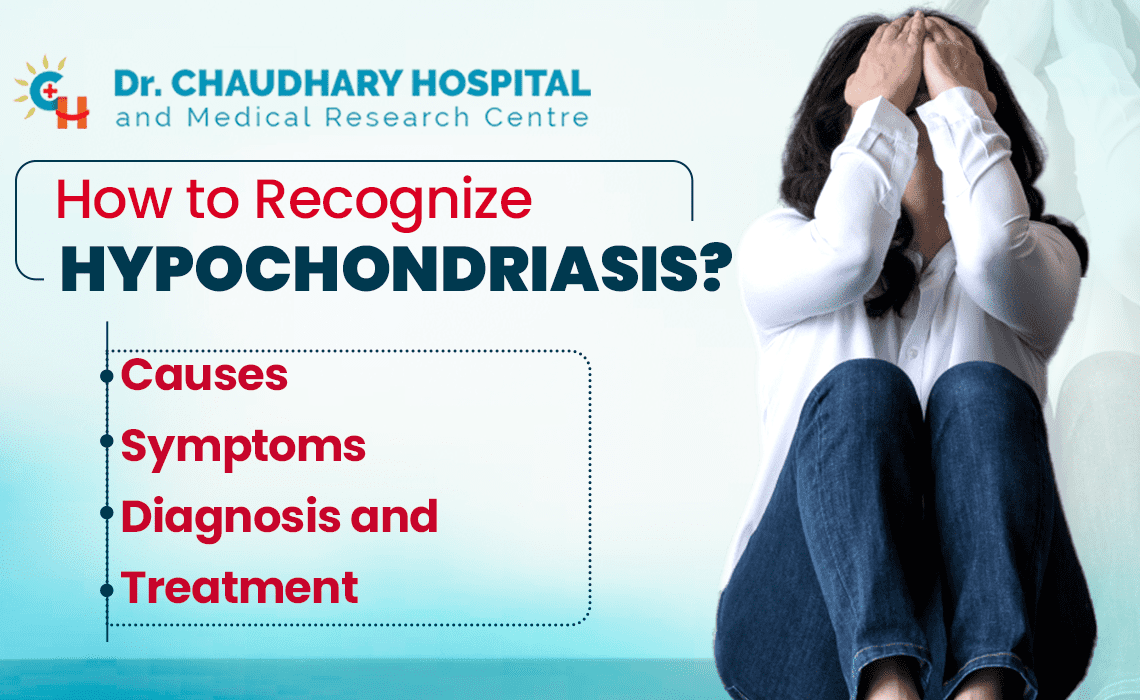A mental health problem known as illness anxiety disorder or hypochondriasis is represented by excessive worry about one’s own health despite the absence of any symptoms of illness. Another name for hypochondriasis is somatic symptom disorder.
A person who has hypochondriasis is referred to as a hypochondriac. A hypochondriac obsesses over their health continually, which causes significant levels of worry, whereas a healthy person often just worries about their well-being when it is essential. A hypochondriac believes that no matter how trivial a health issue, such as a common cold or a mild headache, is a severe and life-threatening condition. The severity of hypochondria relies on how much anxiety and suffering it causes the person experiencing it, as well as how much it interferes with their ability to function normally and be productive daily.
What are the Causes of Hypochondriasis?
There is currently no known cause for hypochondriasis. However, several underlying causes, such as the following, have a role in this health anomaly in people:
Beliefs And Fallacies
Some people search for proof to show a life-threatening sickness is affecting their bodies because they feel restless and unsatisfied with simple explanations for common symptoms. As a result, people misinterpret how the system’s organs work and assume that something is seriously wrong with their health.
Hereditary factors
People who have parents or other close relatives who suffer from hypochondria are more likely to develop the condition themselves.
Unsettling Historical Events
Sometimes a severe disorder in the past that caused a great deal of pain and suffering can cause unwarranted fears of relapsing into the same dangerous health condition.
Associated Medical Issues
People who already suffer from psychiatric disorders including depression, anxiety, and obsessive-compulsive disorder, to name a few, are significantly more likely to develop hypochondriasis.
Risk Factors Associated with Hypochondriasis
In most cases, hypochondriasis develops in young adults, although it can also happen in middle-aged people, and it grows worse as people age. An aging person’s main dread is frequently concern over forgetting their past or experiencing complete memory loss. Some people are more likely than others to develop hypochondriasis due to specific factors. These include:
- Heavy workload and stress, whether at work or at home
- Persistent worry is a major personality trait.
- Frequent online browsing on health and disease-related subjects
- Trauma from childhood, including mental and physical abuse
- A severe medical ailment had in the past
What are the Symptoms of Hypochondriasis?
Most hypochondriacs are worried about their health and believe they are ill despite simply experiencing common bodily sensations like stomach rumbling or a small injury symptom like a skin rash.
The following are the distinctive signs of hypochondriasis:
- Irrational fears of being sick all the time
- Examining the body repeatedly to look for any anomalies
- Avoiding familiar surroundings and well-known individuals out of fear of getting sick
- Concerned about contracting deadly illnesses like cancer or a heart attack
- Skeptical about being sick, either after several doctor visits and medical testing prove their overall health, or completely refusing to seek medical advice.
How can you Treat Hypochondriasis?
The patient’s level of hypochondriasis-related suffering must be determined in order to develop therapies that will eventually help the patient get over their fear and lead a more fulfilling life.
The typical steps in treating hypochondria include:
(CBT) Cognitive Behavioural Therapy
CBT, also known as psychotherapy or talk therapy, aims to provide the patient the freedom to openly discuss their symptoms and develop an understanding of their erroneous thinking in order to give them practical advice on how to reduce anxiety and face various circumstances with ease.
Medications on Prescription
In addition to CBT, the doctor may also recommend antidepressant and anxiolytic medications to the patient. These medications alter neurotransmitter activity in the brain, improve mood and memory, and reduce anxiety.
A doctor would examine a patient for physical issues if they were being treated for hypochondria. The following are their options:
- Expressing an accurate and transparent assessment of the reasons of concern giving the affected person guidance and resources for self-help
- Referring the patient to a therapist or psychologist, particularly if they believe that depression or anxiety may be making the symptoms worse
- Providing medicine, such as antidepressants to lessen anxiety, are all examples of cognitive behavioral therapy.
Lifestyle Improvement
Simple habits like eating a balanced diet, exercising every day, and abstaining from vices like drinking and smoking help the hypochondriac patient to improve their general health, ensuring that they fully recover.
Conclusion
If you believe that you or someone you know is suffering from hypochondria, inform them that you are willing to support them and that you wish to assist them. Discuss the situation with them, pay attention to what they have to say, and encourage them to consult a doctor or other healthcare provider.
We highly value everyone’s participation and also emphasize that the winning criteria were not solely based on the selfie submitted, it included other factors like active participation, the number of tags, and adherence to the contest rules. The winners chosen by our team were deemed truly deserving based on these considerations. We encourage everyone to continue participating in future contests to win exciting prizes.


